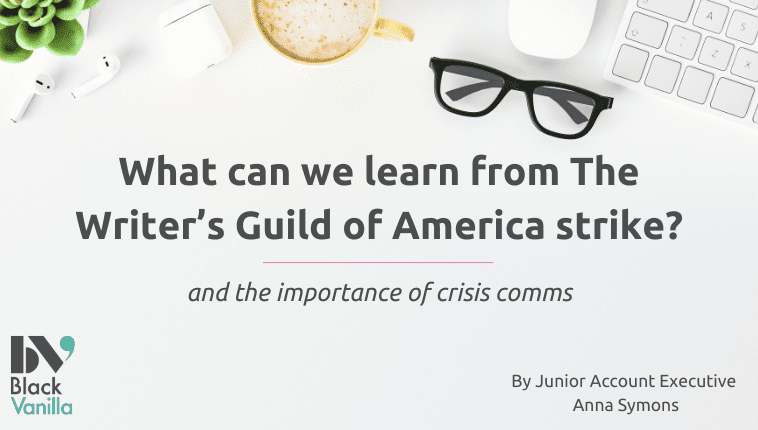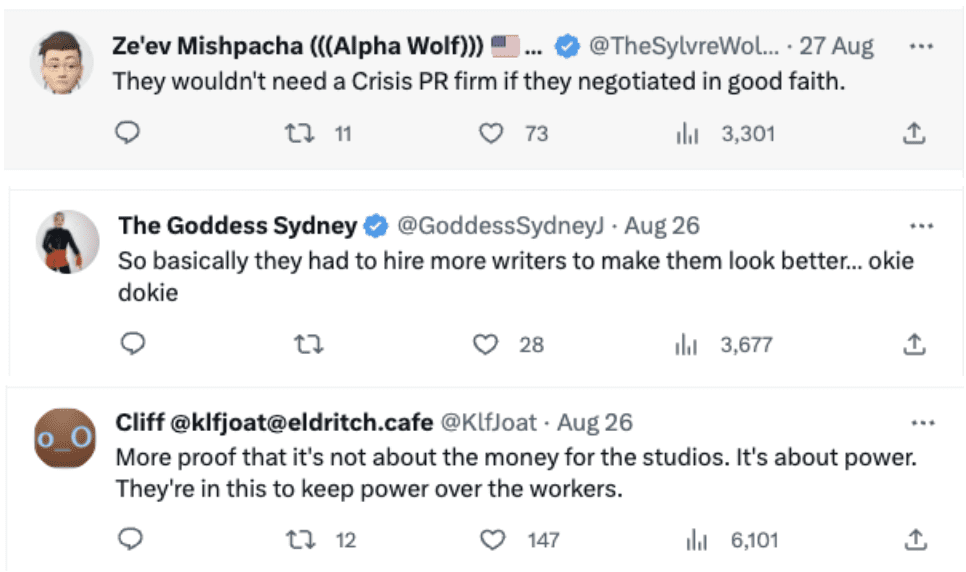
What can we learn from The Writer’s Guild of America strike and the importance of crisis comms?
Last week it was announced that the group of Hollywood writers on strike had reached a tentative agreement with the studios, and this morning the news broke that the union leaders have accepted the contract agreement with the studios, bringing the strike to an end.
Due to pay disagreements with Hollywood producers, more than 11,000 members of The Writer’s Guild of America (WGA) were on strike since 2 May.
The WGA was joined by the Screen Actors Guild and American Federation of Television and Radio Artists (SAG-AFTRA) on 17 July, striking together against the Alliance of Motion Picture and Television Producers (AMPTP) for 148 days before an agreement was made.
Don’t become the story
Back in August, a Hollywood Reporter article shared the news that AMPTP hired a crisis PR firm, The Levinson Group, to help its messaging around the strike action.
Public sentiment to that decision was mostly negative with many speaking out against it on social media. Many people had the same question; why didn’t AMPTP use the money it would be paying the PR firm to pay the writers and actors a fair wage and bring an end to the strike? Replies to the Hollywood Reporter article included:

Caroline Renard, WGA strike captain, posted: ‘So you got money?’ Organisations want to avoid their behaviour during a crisis becoming a secondary story, which is what happened in this instance.
AMPTP’s decision to hire a crisis comms specialising PR agency may have been driven by a studio executive telling Deadline: ‘The endgame is to allow things to drag on until union members start losing their apartments and losing their houses’. [source].
Carefully planned and implemented crisis communications channel messages through key spokespeople, who are media-trained and able to deliver the organisation’s messages in an empathetic way.
The organisation could have been better prepared, helping them to avoid these kinds of side stories.
Using social media in a crisis
The WGA strike has become an interesting case study for communicating through a crisis in the age of social media. AMPTP has no social media presence of its own but the majority of the discussion behind the picket line took place digitally, leaving the organisation with no voice online, and a digital vacuum which could be filled by the strikers.
This was the first time the two organisations had both been on strike against AMPTP since 1960. The media environment has changed considerably since that decade, and organisations can use social media to communicate openly and rally support.
Both WGA and SAG-AFTRA made use of social media to communicate the union’s reasons for striking. There was even a parody account made which was impersonating AMPTP President Carol Lombardini, making the social media conversation thoroughly one-sided.
Social media can feel like an uncomfortable place to be during a crisis, but it can also reach a wide audience quickly and authentically, especially through film and other digital content.
What is crisis comms and why is it important?
Strategic and successful crisis communication is not about trying to make a company or situation look good. It’s not about sweeping stuff under the rug or making bad news go away. Good communication strategies will attempt to present the organisation’s position without taking aim at those speaking against you.
During a crisis, open, honest and timely communication is essential. The tone of voice matters and you need to constantly monitor sentiment and emerging themes so you can be ready to evolve your messaging and response.
Two-way conversation is important, and it is key to note that crisis communication is not about suppressing the other side of the narrative.
The WGA and SAG-AFTRA strike generated global public and media interest and has been a topic of huge public discussion on social media.
Being at the centre of a crisis in the modern digital landscape can be overwhelming and feel uncontrollable. This is particularly hard over a prolonged period of time as we’ve seen in this strike, and when the various parties are so high profile.
Staying on message, harnessing a variety of channels and media types, using film and other digital tools and anticipating how the story will evolve are all part of a crisis comms tool kit.
You need to work through the noise; listening carefully, monitoring sentiment and promoting productive conversations. Ultimately your communications must be based on facts and truth, NOT spin.
If you want to learn more about crisis communications and the training and support we provide at Black Vanilla, get in touch with our expert team by emailing hello@black-vanilla.gg or calling us on 01481 729229.